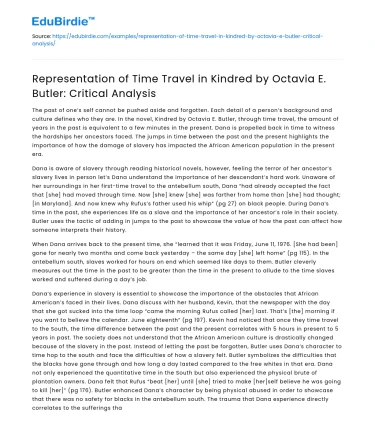The past of one’s self cannot be pushed aside and forgotten. Each detail of a person’s background and culture defines who they are. In the novel, Kindred by Octavia E. Butler, through time travel, the amount of years in the past is equivalent to a few minutes in the present. Dana is propelled back in time to witness the hardships her ancestors faced. The jumps in time between the past and the present highlights the importance of how the damage of slavery has impacted the African American population in the present era.
Dana is aware of slavery through reading historical novels, however, feeling the terror of her ancestor’s slavery lives in person let’s Dana understand the importance of her descendant’s hard work. Unaware of her surroundings in her first-time travel to the antebellum south, Dana “had already accepted the fact that [she] had moved through time. Now [she] knew [she] was farther from home than [she] had thought; [in Maryland]. And now knew why Rufus’s father used his whip” (pg 27) on black people. During Dana’s time in the past, she experiences life as a slave and the importance of her ancestor’s role in their society. Butler uses the tactic of adding in jumps to the past to showcase the value of how the past can affect how someone interprets their history.
Save your time!
We can take care of your essay
- Proper editing and formatting
- Free revision, title page, and bibliography
- Flexible prices and money-back guarantee
When Dana arrives back to the present time, she “learned that it was Friday, June 11, 1976. [She had been] gone for nearly two months and come back yesterday – the same day [she] left home” (pg 115). In the antebellum south, slaves worked for hours on end which seemed like days to them. Butler cleverly measures out the time in the past to be greater than the time in the present to allude to the time slaves worked and suffered during a day’s job.
Dana’s experience in slavery is essential to showcase the importance of the obstacles that African American’s faced in their lives. Dana discuss with her husband, Kevin, that the newspaper with the day that she got sucked into the time loop “came the morning Rufus called [her] last. That’s [the] morning if you want to believe the calendar. June eighteenth” (pg 197). Kevin had noticed that once they time travel to the South, the time difference between the past and the present correlates with 5 hours in present to 5 years in past. The society does not understand that the African American culture is drastically changed because of the slavery in the past. Instead of letting the past be forgotten, Butler uses Dana’s character to time hop to the south and face the difficulties of how a slavery felt. Butler symbolizes the difficulties that the blacks have gone through and how long a day lasted compared to the free whites in that era. Dana not only experienced the quantitative time in the South but also experienced the physical brute of plantation owners. Dana felt that Rufus “beat [her] until [she] tried to make [her]self believe he was going to kill [her]” (pg 176). Butler enhanced Dana’s character by being physical abused in order to showcase that there was no safety for blacks in the antebellum south. The trauma that Dana experience directly correlates to the sufferings that the slaves experienced in the south daily. The time to heal from these wounds adds time in the past but no time in the present. Butler wanted the modern era to understand that the past trauma that the African American community faced is still in the blood of the modern African American communities and should never cease to disappear.
Dana’s ancestors play a key role in symbolizing the hardships that the African American population has faced. “[Dana and Kevin] had fifteen full days together [in the South] and [Dana] marked them off on the calendar – June 19, through July 3. With some kind of reverse symbolism, Rufus called [her] back on July 4” (pg 243) and experienced life as a slave all over again. The many months and years Dana’s been in the South accounts for a few minutes or days in the present. Butler uses this time parameter to symbolize the hardships and difficulties that slaves go through as they are suppressed from the white owners. Even though slavery is no longer permitted in the United States, acknowledgement of the has a greater result on people’s lives rather than ignoring the traumatic experience that the African American’s have faced. Furthermore, Butler usage of time travel from the modern era to the south showcases the importance of many black’s past being disregarded and pushed aside. Instead, Butler wants the African American’s past to be accepted in the society and understand the pain they have faced in their lives.
In the novel, Kindred by Octavia E. Butler, Dana is involved in time travel to understand her ancestor’s difficulties in working in a plantation. The time travel highlights the impact slavery has had on African American population.






 Stuck on your essay?
Stuck on your essay?

